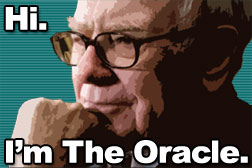
It is common for humans to understand things in moral terms when confronted with a phenomenon they don't understand. For example, faced with the inscrutable vagaries of weather, ancient peoples would interpret poor weather as some sort of recrimination from the gods, and favorable weather as a divine blessing. It is in some ways a very narcissistic view of the world, because it posits human goings on as the ultimate cause of the phenomena.
However, once humans achieve an empirical understanding of the phenomenon, the old moral framework is abandoned in favor of a scientific one. Suddenly the drought is no longer seen as divine vengeance for our moral transgressions. Instead, it's seen as an indifferent naturalistic occurrence that can be predicted and maybe even stopped with the aid of tools, technology, and a coordinated plan of action.
I've noticed that with economics--and particularly the current recession--many people are reverting to a morals-based view of the economy because they lack a proper understanding of it. Hence, the recession and unemployment must be due to some moral failing of the American people: we lack a good work ethic, or we're being one-upped by the Chinese, or we're not educated enough, or we're not thrifty enough, etc. The general idea is that we are being punished for one moral failing or another, or a deficiency in our character, or for the sins of our ideology or way of life. Bad things are happening and it's not clear why; surely we must have angered the gods!
The problem with this way of thinking is that, not only is it not helpful, it is actually actively harmful, making the situation worse. For when we view economics in a moral framework, the remedy that presents itself is the one that makes us feel the cleansing, righteous pain of punishment. And so we undertake "austerity measures"--we begin to spend less, buy fewer things. But ironically when everyone does this in unison--as well as convince politicians that the government should be spending less money, as well--it makes the recession worse and everyone more poor than if they had never changed their spending behavior at all. But this in turn only causes people to become even more austere. It is a vicious cycle; a self-fulfilling prophecy.
Once this understanding of the economic situation is reached--once it is realized that there is a mechanism of self-fulfilling prophecy, a feedback loop, that is the driver of mass unemployment--a very different remedy than austerity presents itself. Indeed, we see that what is needed is a way to break the vicious circle by introducing a giant amount of demand (spending) into the economy. The only player big enough to inject this much demand is the government: it can encourage people to spend by targeting tax breaks to people who will spend the money (e.g., the unemployed), lowering real interest rates so more people will take out loans and/or repay their debts faster, and increasing government spending on infrastructure and state aid (money given to the states will be used to sustain government employee payrolls). What is causing the recession is the downward spiraling of demand; what is needed to end it is a giant, forced injection of demand into the economy.
Pivoting back to the moral understanding of the economy, this advice--to spend spend spend--seems bonkers. That we are experiencing tough times morally implies that we must have done something irresponsible to bring it upon ourselves; surely the irresponsible behavior must have been reckless spending; so how can the remedy to our troubles be even more reckless spending, to double-down on the unvirtuous behavior that got us here? The answer, of course, is that it is simply not the case that immoral behavior on our part has caused the recession, any more than immoral behavior on our part can cause a drought.
To be sure, there are some people who actually really are responsible for what is happening--specific people who did specific things, not all Americans in general. After all, the recession was caused by the financial crisis in 2008, and certainly there were people to blame for this: the investment elites who recklessly leveraged their positions, positions that ultimately rested on the false belief that housing prices would never fall, and complex financial instruments called CDOs were risk-free, AAA assets. And after the recession hit, it was Republicans and gun-shy Democrats who prevented the government from injecting enough stimulus into the economy (Obama's stimulus needed to be somewhere between $1.5 to $2 trillion; it ended up being a paltry $800 million); and even now, it is the Federal Reserve who pursues the lender-friendly (i.e., bank friendly) policy of keeping real interest rates high, which sustains the recession and high unemployment. So there ARE people to blame, but it is specific people for specific, technical things that they are or are not doing; the blame does NOT lie with the American people in general or society in general, and it doesn't have anything to do with moral character or anything like that.
And indeed, when you think about it for a moment, it becomes clear that the moral understanding of the recession doesn't really make any sense. In the 1990s things were going wonderfully; then there was the dot-com bust, and then in the Bush years things were growing again. Then in 2008 the financial crisis struck, and we've been in recession ever since. So in a 20 year period we went up, down, up, and back down again. Are we to believe that we, as a people, were driving this movement in economic fortunes with our personal moral behavior? Were we especially frugal and responsible in the 90s and then suddenly became lazy and incompetent at the end of the decade? Were we hard-working Protestants in the 00's and then suddenly decided we would slack off and charge too much on our credit cards in 2008? The answer is, of course, no. We have been the same people, with the same financial moral fiber, through all these ups and downs.
So this is something to consider as the Occupy Wall Street movement consolidates into whatever it is it's going to consolidate into, and as voters continue to pressure the government into austerity mode, and as the Federal Reserve continues to keep inflation low and (therefore) real interest rates--and unemployment--high. What is needed right now is demand, even though that requires further deficit spending. This isn't sinful behavior; in macroeconomics, there is no such thing.













